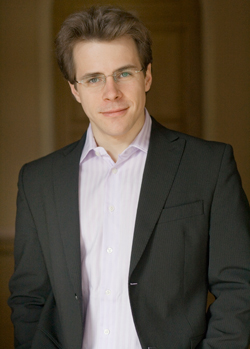by Daniel Hathaway

Although it goes by the name of Symphony No. 60, Haydn’s six-movement work is really a suite recycled from the incidental music to Die Zerstreute, the German reworking of a comedy by Jean-François Regnard staged at the Esterházy Court. The plot concerns an unfocused daydreamer, Leander, who is pushed into a romance with Isabelle by her Parisian mother — but, of course, Isabelle has her eyes on someone else.
You can count on Haydn to be witty, but Il distratto finds him reveling both in sophisticated humor and low-hanging jokes (e.g. subtle musical references to Leander’s distractedness, and a sudden, noisy tuning session by the violins in the finale that had the audience giggling.) Hrůša and the orchestra had infectious fun with the piece, playing with verve and precision and making huge contrasts in dynamics.
Dvořák stepped in for Dvořák last weekend, when The Golden Spinning Wheel, one of four late symphonic poems based on folk tales by Karel Jaromir Erben, filled in for the violin concerto when soloist William Preucil was sidelined with a pinched nerve. The 25-minute work was brand-new for The Cleveland Orchestra, but not for Jakub Hrůša, who obviously reveled in the opportunity to tell its gory story to Cleveland audiences.
That narrative involves a beautiful young maiden, a gullible (or perhaps just nearsighted) king, evil stepmothers and stepsisters, deception, dismemberment, then wizardly intervention, restoration and redemption, all wrapped up in colorful, folk-inspired music and masterful orchestration that invoked vivid mental pictures as the story unfolded.
The program change put two Czech symphonic poems end-to-end on the second half of the program. Happily, Janáček’s Taras Bulba is different enough to hold its own against the Dvořák. Inspired by Gogol’s 1915 novella about the 16th century Cossack captain who led the Slavs in a struggle against Poland, Janáček’s rhapsody paints three scenes in the hero’s life in strikingly modern-sounding music crafted on a cinematic scale.
Hrůša led energetic, sweeping accounts of both works crowned by superb solos (especially from first associate concertmaster Peter Otto and English hornist Robert Walters), thrilling exclamations from the gleaming brass section (a special nod to the horns) and, finally at the end of the Janáček, a riot of chimes and a great rumbling from the organ (Joela Jones).
Like a triumphant boxer after a knockout, Hrůša held his hands high over his head at the ends of movements and pieces on Thursday night. An unusual gesture for a conductor, but an appropriate sign of victory for himself and his troops over some demanding scores.
Published on ClevelandClassical.com October 15, 2013
Click here for a printable version of this article.


